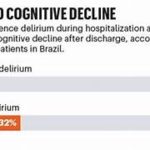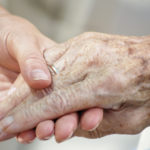Contributed by Tamara G. Fong, MD PhD, Associate Professor of Neurology, Harvard Medical School, Beth Israel Deaconess Medical Center, and Hebrew SeniorLife, Boston, MA USA; Jason Albaum, Vassar College, USA; and Sharon K. Inouye, MD MPH, Milton and Shirley F. Levy Family Chair and Professor of Medicine, Harvard Medical School, Beth Israel Deaconess Medical Center, […]
Category Archives: AD/ADRD
Posts that mention Alzheimer’s Disease or related dementias
Postoperative Delirium and Long-Term Subjective Cognitive Decline After Cardiac Surgery
Contributed by Oluwaseun Johnson-Akeju, MD, Anesthetist-in-Chief at Massachusetts General Hospital and Henry Isaiah Dorr Associate Professor of Research and Teaching in Anaesthetics and Anaesthesia at Harvard Medical School, and Ariel Mueller, MA, Administrative Director for Research in the Department of Anesthesia, Critical Care and Pain Medicine at Massachusetts General Hospital on behalf of the Minimizing […]
The Trajectory of Cognitive Aging after Experiencing Postoperative Delirium
Contributed by Zachary Kunicki, PhD, Assistant Professor of Psychiatry and Human Behavior, Warren Alpert Medical School of Brown University, Providence, RI, USA; Richard Jones, PhD, Professor of Psychiatry and Human Behavior and Neurology, Warren Alpert Medical School of Brown University, Providence, RI, USA; and Sharon Inouye, MD MPH, Milton and Shirley F. Levy Family Chair […]
Postoperative Delirium and Biomarkers of Alzheimer’s Disease: What We Know and What We Need to Know
Contributed by Dr. Sophia Wang, MD, MS, Assistant Professor of Clinical Psychiatry, Indiana University School of Medicine Postoperative delirium affects 15-50% of older adults undergoing major surgery.1 The literature strongly supports a bidirectional relationship between delirium and dementia.2 While both delirium and dementia affect cognition, they are quite different in their clinical presentations. Delirium is […]
Association between Symptom Domains of Delirium and Outcomes in Hospitalised Adults
Contributed by Zoë Tieges, PhD, Psychology Research Fellow, Geriatric Medicine, Usher Institute, The University of Edinburgh, Edinburgh, UK Research question: do patients with delirium experience poorer outcomes when they have certain symptoms? Delirium is a syndrome with a wide spectrum of clinical presentations. According to DSM-5 (and the recent DSM-5 Text Revision) criteria, the key […]
Frailty, Postoperative Delirium and Cognitive Dysfunction: Where is the Association?
Contributed by Elizabeth Mahanna-Gabrielli, MD Department of Anesthesiology, Miller School of Medicine, University of Miami, Miami, Florida As a neuroanesthesiologist and intensivist, I’ve seen many frail patients come into the operating room and intensive care unit. During the early years of my career, frailty was informally defined as patient who was elderly, weak, and deconditioned; clinicians […]
Delirium, Dementia, and Adverse Outcomes
Contributed by Thiago J. Avelino-Silva, MD, PhD*; Flávia B. Garcez, MD, PhD* *Faculty of Medicine, University of São Paulo, São Paulo, Brazil Delirium results from an intricate combination of dozens of possible predisposing and precipitating factors1. Older age, functional dependence, and preexisting cognitive impairment are key determinants for its occurrence, but the latter is a […]
Does Alzheimer’s Disease and Related Dementias Modify Delirium Severity and Hospital Outcomes?
Contributed by Tammy T. Hshieh, MD MPH, Associate Physician at Brigham and Women’s Hospital, Harvard Medical School and Research Faculty at the Aging Brain Center, Hebrew Senior Life NIDUS supports junior researchers by seeding pilot grants. I was fortunate to have received such an award in 2017. At the time, I had recently completed a […]
Interaction of Delirium and Dementia on Cognitive Decline
The differences between delirium and dementia can be difficult to spot. If an elderly man with Alzheimer’s disease tends to become confused or agitated in the evening (a condition often known as “sundowning”¹) is his behavior dementia- or delirium-related? Moreover, what are the biological bases that differ between delirium and dementia? New research published in […]
Connectivity and Plasticity: Two factors that may influence cognitive decline after delirium
Delirium¹ – a serious disturbance in mental abilities that results in confused thinking and reduced awareness of the environment – is a costly and common condition. Though delirium can affect anyone, it is most prevalent in the elderly, affecting up to 50% of hospitalized seniors. However, it is not yet known why some individuals develop […]









